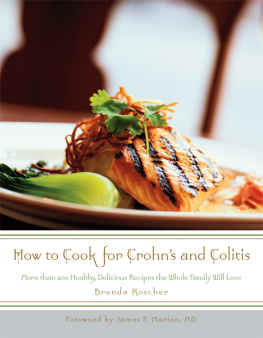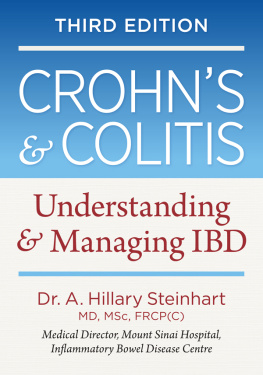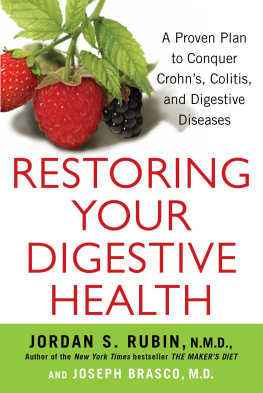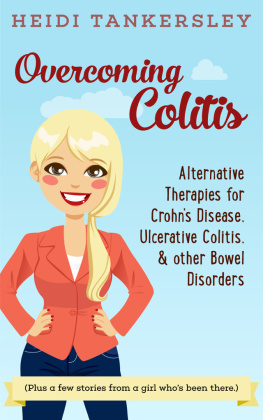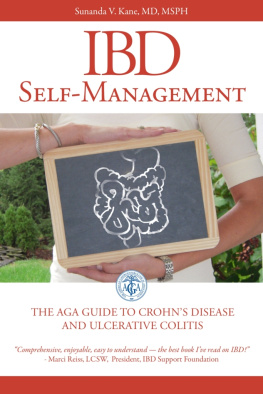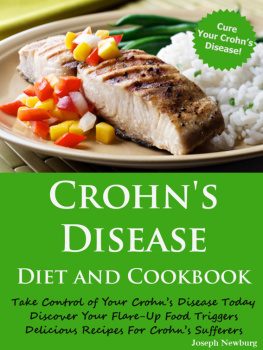As a physician, it has always been my privilege to be inspired by my patients responses to their illnesses. Since I specialize in treating patients with Crohns disease and ulcerative colitis, I am given more than ample opportunity to witness remarkable feats of recovery and renewal in between periods of catastrophic relapses.
I think it is impossible not to be inspired by Brenda Roschers story of an unexpected diagnosis of severe Crohns disease, which nearly ended her life. Brendas story is ultimately a love story in that her love of food and the joy that she derived from it could not be overcome by her severe physical illness. Once Brenda was able to recover, she courageously faced the new reality of her plumbing and learned how to love food again. Like a mountain climber who has taken a bad tumble, a skier who has broken a leg, or a surfer who has encountered a shark, she jumped right back into the game, and all of us get to benefit from her bravery.
The recipes in this cookbook are well thought out and nutritious and would, I think, do proud the dinner table of anyone who loves food, whether they have Crohns disease and ulcerative colitis or not. So I urge you to read and get cookingbon apptit!
James F. Marion, MD
Assistant Clinical Professor of Medicine
Mount Sinai School of Medicine
Introduction: My Story
I was diagnosed with Crohns disease in December 2001. My symptoms, though, had begun two years earlier. In the fall of 1999, I had diarrhea and pain in my abdomen every day for a month. I felt tired all the time. I thought it was the flu or that I had a bug that I just couldnt shake. I saw a doctor. He poked around my belly and then told me it was probably gall bladder disease (common for women my age). Thanks so much! He suggested a bland diet that included cutting down on fats. The pain, however, continued to come and go, sometimes being unbearable. The diarrhea didnt stop, and the gasoh my God! I kept wondering when I was going to pass those gall stones!
There was a heaviness in my lower abdomen, and my abdominal pain worsened, especially when trying to poo, which was most of the time. I returned to my regular doctor, and after an exam and blood work, she sent me off to have both external and internal ultrasounds. They found nothing other than I had a lot of gas. News flash! I just wasnt getting any answers. For about a year and a half I went on living with the symptoms. I lost twenty-five pounds.
In September 2001, my husband Dan and I moved to Myrtle Beach from Charleston, SC. Setting up a new household is stressful. Finding your way around a new city is stressful. Looking for a new job is stressful. And the move was particularly stressful for me because I was moving away from my daughters. Though they were adults (eighteen and twenty years old), they were still my babies.
On Christmas Day Dan and I invited a friend over to share turkey with all the trimmings. I made it through preparing the feast, even ate a little, and then excused myself to lie down. I couldnt do any more because of the pain. I thought, Maybe this is it, maybe Im finally going to pass those gall stones, or maybe its appendicitis, or maybe Im going to poop myself to death!
For the next couple of days, it was all I could do to get out of bed to get to the bathroom because the pain was so intense. Then it happened. A pain shot through me like someone had stabbed me the gut and was twisting the blade. I gasped for breath. Dan rushed me to the hospital. I woke up in the ICU with a catheter; a tube down my nose into my stomach; IVs in my legs, arms, and belly; my abdomen distended and terribly painful. The doctor told me I had nearly died of a disease I had never heard of: Crohns.
Five days later I was released from the hospital with prescriptions for antibiotics, steroids, painkillers, and acid reducers. The only information on Crohns disease I received before leaving the hospital was that Crohns is believed to be an autoimmune disease that affects the digestive tract. Surgery is often performedsometimes repeatedlyand there is no cure.
When I returned home, I had a lot of questions. What exactly is Crohns? What are the symptoms? What causes it? Is there anything I can do to control it? And most immediately, what can I eat? What cant I eat? Thats when my research began.
1. Crohns Disease and Ulcerative Colitis
Crohns disease is named for Burrill Bernard Crohn after he and others described it in a published article in 1932. It is also referred to as ileitis. Crohns disease is an inflammation of the digestive tract. It occurs most frequently in the small intestine, although it can appear anywhere from the mouth to the anus. Crohns and its sister disease, ulcerative colitis, fall under the umbrella of inflammatory bowel disease (IBD). Crohns and colitis share similar symptoms, but colitis differs in that it usually affects only the colon and rectum. IBD is a chronic disease and should not be confused with IBS (irritable bowel syndrome), which has some similar symptoms. IBS does not have the serious complications of IBD, nor is it medically treated the same way. During an attack of IBDor flare-up, as it is commonly calledany of the following symptoms can occur:
Symptoms of IBD
diarrhea
low-grade fever
fatigue
loss of appetite
abdominal cramping and pain
weight loss
flatulence (gas)
blood in the stool
headaches
vomiting
Complications of IBD
malabsorption (nutrients are poorly absorbed)
steatorrhea (excess fat not absorbed, creating floating stool)
peritonitis (intestinal wall leaks)
strictures (partial obstruction of the bowel)
fistulas and abscesses (abnormal passages that lead from one loop to another or even to other organs)
iron-deficiency anemia
malnutrition
Theories of What Causes Crohns and Colitis
Genetic Factors: Twenty percent of patients have a close family member with the disease. It is also more prevalent in those of European and Jewish descent.
Virus or bacterium that causes the immune system to produce antibodies that attack the digestive tract.
Environmental Factors: The disease is found more frequently in industrialized nations and in those whose diet consists of high-fat and refined foods.
Possible Contributing Factors
smoking
oral contraceptive use
MMR vaccine (Measles-Mumps-Rubella)

